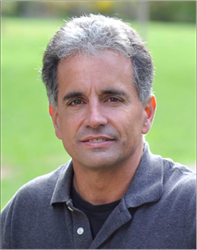 Steve Thomas is coordinator of Mennonite Men, the men’s organization of Mennonite Church USA. Steve lives in Goshen, Indiana. The mission of Mennonite Men is engaging men to grow, give and serve as followers of Jesus. For more information visit MennoniteMen.org.
Steve Thomas is coordinator of Mennonite Men, the men’s organization of Mennonite Church USA. Steve lives in Goshen, Indiana. The mission of Mennonite Men is engaging men to grow, give and serve as followers of Jesus. For more information visit MennoniteMen.org.
In a gathering of men, Ben[i], a 30-something man, shares from his heart. He speaks of the pain he’s caused, and the pain he suffers. He talks about his anger, brokenness and struggle. And he asks for help to be a better man for his family and community.
In the world, though lacking true strength, he projects toughness. Among these men however, this man is vulnerable with his stuff and in his search for another way of life than the hard path he’s known. While he shares, the men in this circle listen and nod with understanding. They don’t judge but show him compassion and respect. In short, they love him. And their actions transform his pain.
Love is a verb. It’s a powerful verb indeed, strong enough to overcome the forceful verbs of toxic masculinity — fear, hate, disrespect, domination and violation. Unleashed in our culture, these actions not only harm women and children, but men as well.
They, like Ben, need to experience the transforming power of love. As Richard Rohr teaches, what we don’t transform, we transmit. When fear, pain and hate are transmitted, people suffer. But acts of love break the cycle of toxic masculinity, transforming suffering into new life.
Promoting healthy masculinity, Mennonite Men is exploring ways to practice love. With our program JoinMen, we seek to create spaces where men can connect and share with one another, allowing love to transform our brokenness. As this happens, not only do we experience God’s healing and hope, but we gain wisdom from their collective experience.
 In one of our retreats, Healthy Masculinity: On Being a Man, we claim our identity as beloved sons of God, called to love as Jesus loved. We turn to the writer’s word to the young Timothy: “God did not give us a spirit of timidity, but the Spirit who makes us strong, loving and wise” (2 Timothy 1:7).
In one of our retreats, Healthy Masculinity: On Being a Man, we claim our identity as beloved sons of God, called to love as Jesus loved. We turn to the writer’s word to the young Timothy: “God did not give us a spirit of timidity, but the Spirit who makes us strong, loving and wise” (2 Timothy 1:7).
Together, these three characteristics in dynamic tension form the basis for healthy masculinity. It’s not about being passive or timid — as sometimes presented in our Anabaptist tradition — but being strong, loving and wise in the Spirit. The practice of love is coupled with strength (power) and wisdom. Within this framework, we can understand how to exercise power in constructive ways.
Martin Luther King, Jr. understood the transforming power of God’s love. He described the dynamic tension between love and power. King taught that appeals of love “must be undergirded by some form of constructive power.” Power and love are not opposites, as often thought, where “love is identified with a resignation of power and power with a denial of love.” Instead, “what is needed is a realization that power without love is reckless and abusive and that love without power is sentimental and anemic. Power at its best is love implementing the demands of justice.” Knowing how to exercise love and power requires wisdom.
Action that unites love, strength and wisdom is especially powerful. This is what Jesus demonstrated to bring about God’s peace.
Seeking this peace, men need to learn the way of Jesus, which takes a lifetime of practice with others. This is what the gathering of men is about — allowing the transforming power of God’s love to work within and through their lives.
Together with Ben, their new companion on the journey, men in their gathering seek how to love, exercise true strength, and be wise in the way of Jesus.
And this, too, is what we seek as we engage men to follow Jesus: that all together, we become strong, loving and wise for God’s peace in our world.
_________________________________
[i] Name has been changed.


